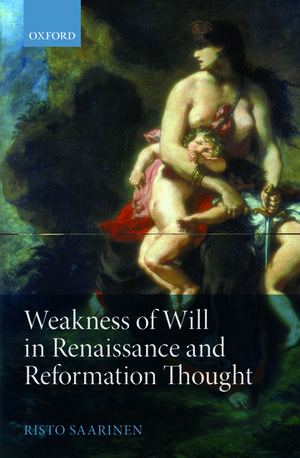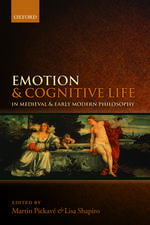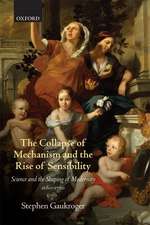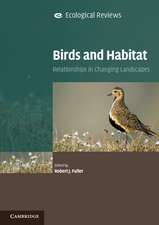Weakness of Will in Renaissance and Reformation Thought
Autor Risto Saarinenen Limba Engleză Hardback – 30 iun 2011
Preț: 545.41 lei
Preț vechi: 696.30 lei
-22% Nou
Puncte Express: 818
Preț estimativ în valută:
104.36€ • 108.96$ • 86.37£
104.36€ • 108.96$ • 86.37£
Carte tipărită la comandă
Livrare economică 24-31 martie
Preluare comenzi: 021 569.72.76
Specificații
ISBN-13: 9780199606818
ISBN-10: 0199606811
Pagini: 258
Dimensiuni: 171 x 238 x 22 mm
Greutate: 0.5 kg
Ediția:New.
Editura: OUP OXFORD
Colecția OUP Oxford
Locul publicării:Oxford, United Kingdom
ISBN-10: 0199606811
Pagini: 258
Dimensiuni: 171 x 238 x 22 mm
Greutate: 0.5 kg
Ediția:New.
Editura: OUP OXFORD
Colecția OUP Oxford
Locul publicării:Oxford, United Kingdom
Recenzii
[T]he book remains a most valuable contribution to an important issue in a very large field of authors and texts yet to be fully explored and explicated.
The book reviews an interesting and compelling repertoire of scholars from antiquity to the Reformation ... The study sheds light on a topic of great significance in early modern Europe.
Saarinen's analyses are clear and cogent throughout the book ... It is a measure of Saarinen's superb handling of this heterogeneous material that he acknowledges the philosophical insufficiency of some of it ... and still finds very instructive ways to use these texts in order to shed considerable light on their relevance to the theory of action and the moral psychology involved in weakness of will. In a convincing manner, Saarinen has certainly charted a lot of territory previously more or less unknown to the scholarly discussions on weakness of will in a historical perspective. As with his first book on the subject, this will hopefully prove a ground-breaking enterprise soon to be followed by other scholars in the area of early modern thought.
Saarinen provides a fascinating and in-depth study relevant to philosophical and theological anthropology, as well as to the Christian discussion of hamartiology. His nuanced treatment also breaks down the dichotomies that older scholarship posited between philosophy and theology, Renaissance and Reformation, humanism and scholasticism. It highlights the creative and eclectic nature of this intellectual period.
Saarinens book represents fine research on the notion of akrasia in Reformation thought.
The book reviews an interesting and compelling repertoire of scholars from antiquity to the Reformation ... The study sheds light on a topic of great significance in early modern Europe.
Saarinen's analyses are clear and cogent throughout the book ... It is a measure of Saarinen's superb handling of this heterogeneous material that he acknowledges the philosophical insufficiency of some of it ... and still finds very instructive ways to use these texts in order to shed considerable light on their relevance to the theory of action and the moral psychology involved in weakness of will. In a convincing manner, Saarinen has certainly charted a lot of territory previously more or less unknown to the scholarly discussions on weakness of will in a historical perspective. As with his first book on the subject, this will hopefully prove a ground-breaking enterprise soon to be followed by other scholars in the area of early modern thought.
Saarinen provides a fascinating and in-depth study relevant to philosophical and theological anthropology, as well as to the Christian discussion of hamartiology. His nuanced treatment also breaks down the dichotomies that older scholarship posited between philosophy and theology, Renaissance and Reformation, humanism and scholasticism. It highlights the creative and eclectic nature of this intellectual period.
Saarinens book represents fine research on the notion of akrasia in Reformation thought.
Notă biografică
Risto Saarinen received his Dr. Theol. in 1988 and Dr. Phil. in 1994, both at the University of Helsinki. His PhD dissertation, 'Weakness of the Will in Medieval Thought' (1994), received broad scholarly attention. From 1994 to 1999 Saarinen worked as Research Professor at the Institute for Ecumenical Research in Strasbourg, France. Since 2001 he has held the chair of Ecumenics at the University of Helsinki. Saarinen has published extensively in the fields of medieval and early modern philosophy and theology as well as contemporary ecumenism. From 2008 to 2013 he has been in charge of the Renaissance and Reformation research team on 'Philosophical Psychology, Morality and Politics' at the Finnish Academy's Centre of Excellence.























